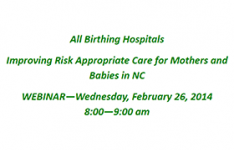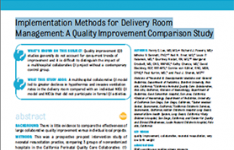News
Here's the recent news from PQCNC.
…of 12 states with greater than 100K deliveries per year, North Carolina and New Jersey tied for first at 2% Read more...
Conservative Management of Preeclampsia LS2 / Neonatal Abstinence Syndrome LS2/ Patient Family Engagement 2 KickoffMay 8, 2014McKimmon CenterRaleigh, NC9:00 - 3:30 Read more...
PQCNC had a number of presentations at the Pediatrics Academic Societies metting in Vancouver, Canada, May 3-6 2014...Nancy DeMaria, Clinical Initative Coordinator from PQCNC: Improving Exclusive Human Milk Rates in Well Baby Nurseries through a Collaborative, Hospital-Based Quality Improvement Initative Read more...
The Perinatal Quality Collaborative of North Carolina (PQCNC) is leading transformations in the delivery of value based perinatal healthcare in North Carolina and nationally. PQCNC is a statewide organization which includes 55 hospitals with delivery services, family representatives, perinatal medical and nursing providers, payer groups and state leaders united in their determination to make North Carolina the best place to be born. Read more...
In 1998 Dr. Gary Kaplan, the CEO of Virginia Mason Medical Center in Seattle received some bad news about his hospital. It was losing money. So Dr. Kaplan started studying how other hospitals were being run to see if there was a better way to manage his hospital. He scoured the country, looking for a hospital with a management system worth adopting, but he never found one. Instead he ended up in Japan. At a Toyota factory. When Dr. Read more...
We are now registering teams for this initiative - this includes existing PFE teams that wish to complete some advanced work, as well as teams that are new to PFE that would like to put some structure and processes in place to support their current efforts. We have recruited experts from across NC who are working together to define the project - including the charter, aim, scope, outcomes, data collection tool, and action plan. Read more...
Through the Department of Public Health, North Carolina is one of 13 states participating in the national Collaborative Improvement and Innovation Network (COIIN) to reduce infant mortality. One of the five focus areas is perinatal regionalization…improving risk appropriate care for mothers and babies and reviewing classification of NICU levels in the state. Read more...
An article in a recent edition of Pediatrics suggests that “collaborative efforts resulted in larger improvements in delivery room outcomes and processes than individual efforts or nonparticipation.”Article here: ABSTRACT Read more...








